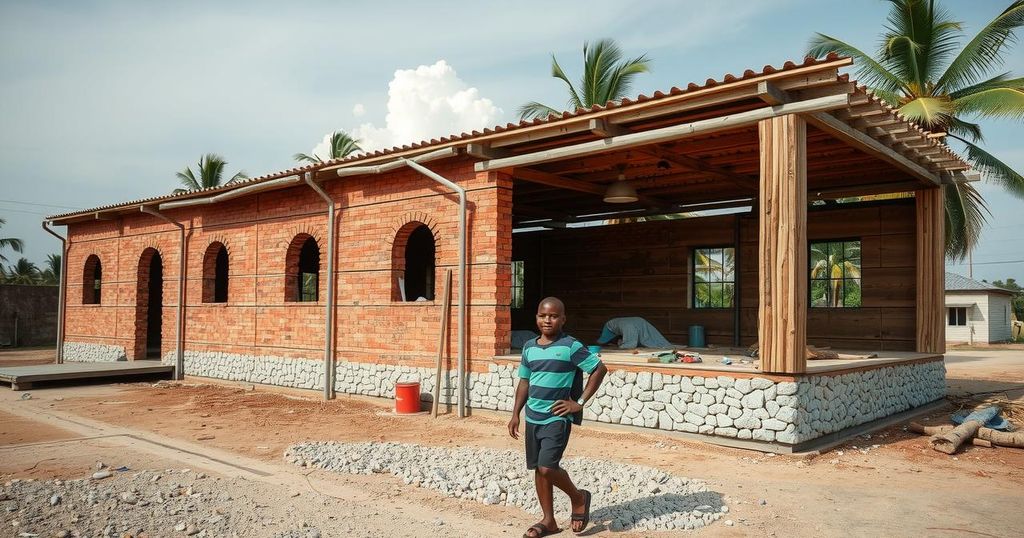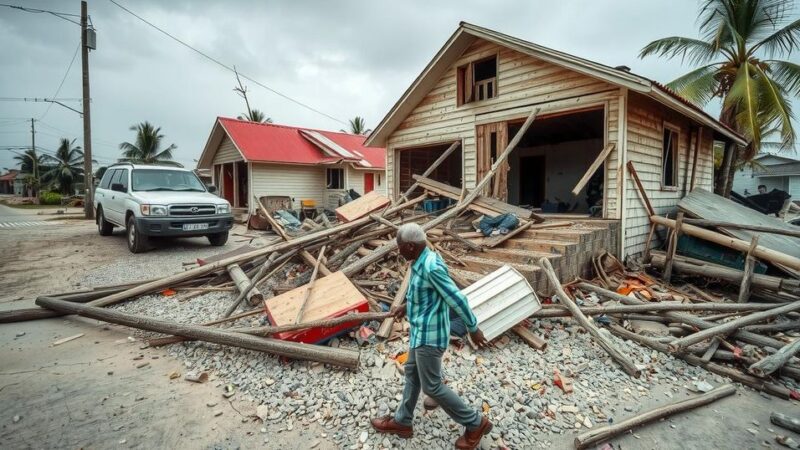Mozambique has begun constructing shelters for Cyclone Chido victims, which caused significant loss of life and infrastructure damage. The government, alongside international partners, aims to provide durable housing to prevent future destruction. UNICEF reports that approximately 174,000 people are affected as assessments continue, with concerns over an ongoing cholera outbreak exacerbated by the storm’s impact.
Mozambique has commenced the construction of shelters for the victims of Cyclone Chido, which wreaked havoc across three northern regions of the country on Sunday. The cyclone resulted in 70 fatalities and around 600 injuries, in addition to extensive destruction. During a site visit in Nampula province, Trade and Industry Minister Silvino Moreno emphasized the government’s commitment to providing necessary aid while highlighting the support from international partners.
Minister Moreno articulated that constructing homes with durable materials is a priority, aiming to prevent similar devastation in the future brought upon by inadequate construction methods. Many homes in the affected areas were made from mud and reeds, proving to be highly vulnerable to the cyclone’s intensity.
Prior to impacting Mozambique, Cyclone Chido also devastated Mayotte, a group of French islands, leading to significant casualties and infrastructure damage, particularly among vulnerable populations, including asylum seekers and refugees. The storm continued its destructive path in southern Malawi, causing damages to houses and infrastructure.
Mozambique’s meteorology agency has warned that the country should prepare for additional storms during the ongoing rainy season, urging improved readiness among communities. UNICEF has reported that approximately 174,000 individuals have been impacted, with numbers likely to rise as ongoing assessments take place. Among the destroyed infrastructure are numerous classrooms and at least 20 health facilities.
Michael Chimedza, UNICEF’s field office head in Zambezia province, noted that his organization has requisitioned resources to assist 50,000 people immediately and has allocated funds for local response training. The cyclone particularly affected Nampula, Cabo Delgado, and Niassa provinces, leaving over 25,000 families without power and devastating crucial infrastructure, including roads, health units, and water supplies. The recent support challenge is compounded by an ongoing cholera outbreak in the region, raising concerns about the potential exacerbation of health crises due to the recent disaster.
Cyclone Chido has caused severe disruptions in Mozambique, impacting several regions and leading to substantial loss of life and property. Prior to targeting Mozambique, the cyclone caused damage in Mayotte, and its influence was also felt in southern Malawi. The vulnerability of many communities reflects a broader issue related to the quality of housing and infrastructure in these regions. This disaster has prompted local and international bodies, including UNICEF, to mobilize resources and support for affected populations as the country braces for more storms during the rainy season.
The damage inflicted by Cyclone Chido in Mozambique underscores the urgent need for resilient housing and the importance of community preparedness in the face of natural disasters. As reconstruction efforts begin, the collaboration between governmental agencies and international partners will be crucial to ensure that affected communities receive immediate assistance and that the lessons learned from this disaster lead to improved infrastructure and training initiatives for the future. The ongoing threats posed by additional storms and health crises like cholera further amplify the necessity for a well-coordinated response to protect vulnerable populations.
Original Source: www.voanews.com







